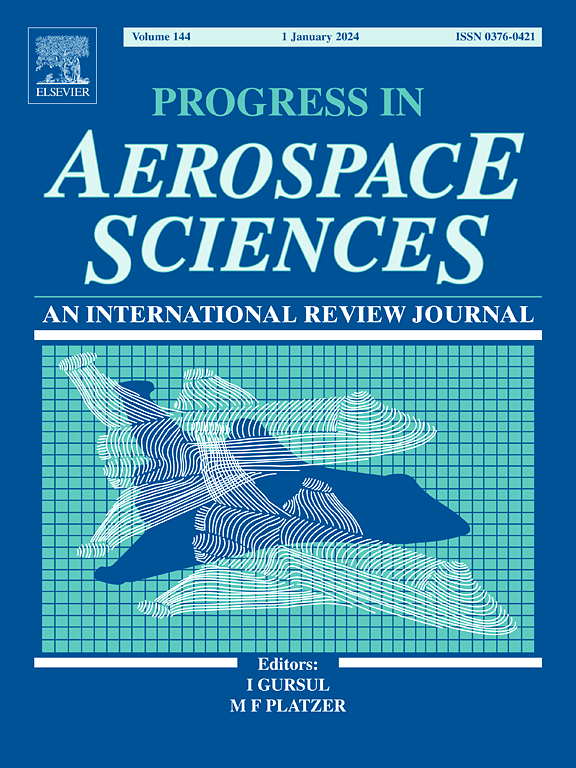面向航空发动机燃烧室的可持续性航空燃料:燃料对燃烧性能的影响
IF 11.5
1区 工程技术
Q1 ENGINEERING, AEROSPACE
引用次数: 0
摘要
在航空工业中应用可持续航空燃料(SAFs)已成为减少二氧化碳(CO2)净排放量的一项关键战略,同时可最大限度地减少对现有飞机和发动机系统的改装。可持续航空燃料是通过生物、热和化学(或其组合)转化途径从可持续原料中提取的,但由于其独特的物理和化学性质,目前可用于航空发动机的可持续航空燃料与传统化石基喷气燃料的最大混合比例为 50%。为了能够使用 100% 的 "无须添加 "的 SAF,已经开展了大量研究,以更好地了解燃料对航空发动机燃烧器燃烧性能的影响,特别是 SAF 与传统喷气燃料之间的比较。本文旨在对这一主题进行全面综述,首先介绍了传统喷气燃料和 SAF 的生产途径,这是导致相关燃料具有不同理化特性的根本原因。然后,探讨和讨论基本燃烧特性(雾化、点火和火焰速度)与燃料特性之间的关系。随后,总结了目前可用的组件和发动机级测试/模拟,对传统喷气燃料和 SAF 的排放、贫喷(LBO)极限和燃烧不稳定性进行了比较。最后,总结并讨论了从 2006 年到最近 2023 年使用 SAF 燃料的代表性飞行测试。最后,本文提出了重要结论和 SAF 的未来发展方向。本文章由计算机程序翻译,如有差异,请以英文原文为准。
Towards drop-in sustainable aviation fuels in aero engine combustors: Fuel effects on combustion performance
The application of sustainable aviation fuels (SAFs) in aviation industry has emerged as a key strategy for reducing the net carbon oxide (CO2) emissions while minimizing modifications to the current aircraft and engine systems. SAFs, which are derived from sustainable feedstocks through biological, thermal and chemical (or their combinations) conversion pathways, can be used in current aero engines, however, at a maximum blending ratio of 50 % with conventional fossil-based jet fuels due to their distinct physical and chemical properties. To enable the use of 100 % ‘drop-in’ SAFs, extensive research has been conducted to obtain a better understanding of the fuel effects on the combustion performance of aero engine combustors, especially the comparison between SAFs and conventional jet fuels. The present paper aims to provide a comprehensive review on this topic by firstly introducing the production pathways of both conventional jet fuels and SAFs, which serve as the root cause of the distinct physiochemical properties among the fuels of interest. Then, the relationship between fundamental combustion properties (atomization, ignition and flame speed) and fuel peculiarities is explored and discussed. This is followed by a summary of the currently available component- and engine-level tests/simulations which compare the emissions, lean blowout (LBO) limit and combustion instabilities of conventional jet fuels and SAFs. Finally, representative flight tests fueled by SAFs ranging from 2006 to the most recent 2023 are summarized and discussed. The paper closes with key conclusions and future directions for the development of SAFs.
求助全文
通过发布文献求助,成功后即可免费获取论文全文。
去求助
来源期刊

Progress in Aerospace Sciences
工程技术-工程:宇航
CiteScore
20.20
自引率
3.10%
发文量
41
审稿时长
5 months
期刊介绍:
"Progress in Aerospace Sciences" is a prestigious international review journal focusing on research in aerospace sciences and its applications in research organizations, industry, and universities. The journal aims to appeal to a wide range of readers and provide valuable information.
The primary content of the journal consists of specially commissioned review articles. These articles serve to collate the latest advancements in the expansive field of aerospace sciences. Unlike other journals, there are no restrictions on the length of papers. Authors are encouraged to furnish specialist readers with a clear and concise summary of recent work, while also providing enough detail for general aerospace readers to stay updated on developments in fields beyond their own expertise.
 求助内容:
求助内容: 应助结果提醒方式:
应助结果提醒方式:


